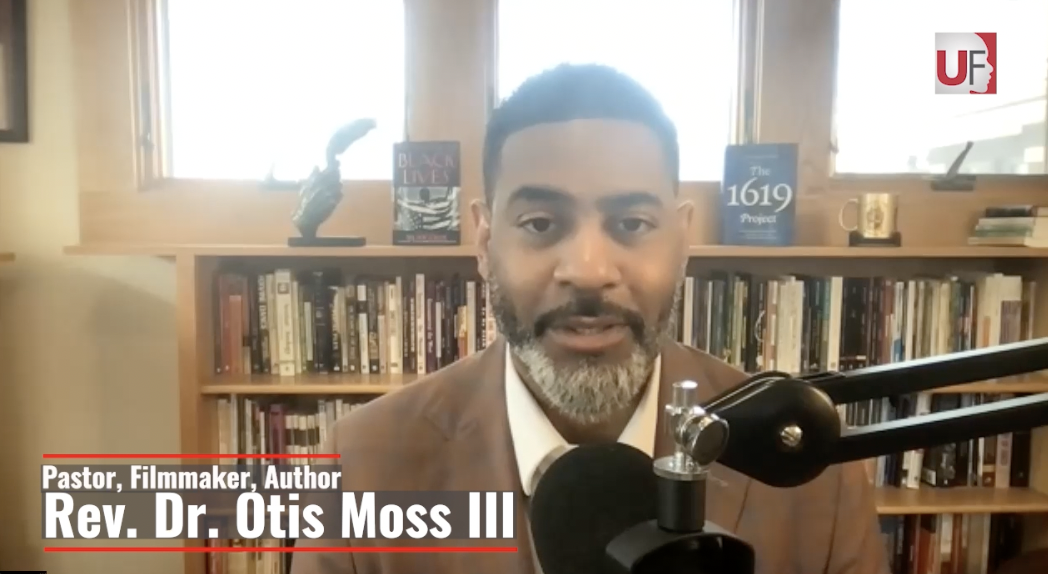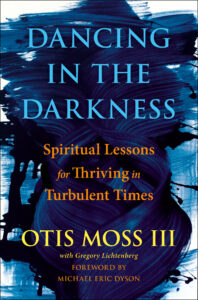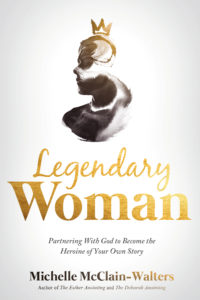
by Allen Reynolds, UrbanFaith Editor | Feb 20, 2023 | Black History, Commentary, Headline News, Magazine, Social Justice |
Rev. Dr. Otis Moss III is one of the most prolific prophetic voices of our generation. He is the Senior Pastor of Trinity United Church of Christ in Chicago, IL and his new book Dancing in the Darkness gives practical wisdom to face the darkness in our lives with prophetic hope. UrbanFaith editor Allen Reynolds sat down with his fellow HBCU and Yale alumnus, the one and only Rev. Moss to discuss his new book Dancing in the Darkness: Spiritual Lessons for Thriving in Turbulent Times. You can find the book everywhere books are sold and more about the book is below.
Rev. Moss serves as Senior Pastor of Trinity United Church of Christ which was the home church of President Barack and Michelle Obama. He has won multiple awards for his short film Otis’ Dream about his grandfather’s fight to vote in the United States. His parents were on the front line of the Civil Rights Movement, and he has been at the forefront of the fight for justice and civil rights in the 21st century. He calls himself a blues man committed to uniting love and justice in the tradition of Rev. Dr. Martin Luther King Jr. More about the book is below.

Once again, as Dr. Martin Luther King, Jr. first observed in the 1960s, it is midnight in America—a dark time of division and anxiety, with threats of violence looming in the shadows. In 2008, the Trinity United Church in Chicago received threats when one of its parishioners, Senator Barack Obama, ran for president. “We’re going to kill you” rang in Reverend Otis Moss’s ears when he suddenly heard a noise in the middle of the night. He grabbed a baseball bat to confront the intruder in his home. When he opened the door to his daughter’s room, he found that the source of the noise was his own little girl, dancing. She was simply practicing for her ballet recital.
In that moment, Pastor Moss saw that the real intruder was within him. Caught in a cycle of worry and anger, he had allowed the darkness inside. But seeing his daughter evoked Psalm 30: “You have turned my mourning into dancing.” He set out to write the sermon that became this inspiring and transformative book.
Dancing in the Darkness is a life-affirming guide to the practical, political, and spiritual challenges of our day. Drawing on the teachings of Dr. King, Howard Thurman, sacred scripture, southern wisdom, global spiritual traditions, Black culture, and his own personal experiences, Dr. Moss instructs you on how to practice spiritual resistance by combining justice and love. This collection helps us tap the spiritual reserves we all possess but too often overlook, so we can slay our personal demon, confront our civic challenges, and reach our highest goals.

by Urban Faith Staff | Dec 20, 2011 | Feature, Headline News |
 “And there were in the same country shepherds abiding in the field, keeping watch over their flock by night. And, lo, the angel of the Lord came upon them, and the glory of the Lord shone round about them: and they were sore afraid. And the angel said unto them, Fear not: for, behold, I bring you good tidings of great joy, which shall be to all people. For unto you is born this day in the city of David a Saviour, which is Christ the Lord. And this shall be a sign unto you; Ye shall find the babe wrapped in swaddling clothes, lying in a manger. And suddenly there was with the angel a multitude of the heavenly host praising God, and saying, Glory to God in the highest, and on earth peace, good will toward men.” – Luke 2:8-14
“And there were in the same country shepherds abiding in the field, keeping watch over their flock by night. And, lo, the angel of the Lord came upon them, and the glory of the Lord shone round about them: and they were sore afraid. And the angel said unto them, Fear not: for, behold, I bring you good tidings of great joy, which shall be to all people. For unto you is born this day in the city of David a Saviour, which is Christ the Lord. And this shall be a sign unto you; Ye shall find the babe wrapped in swaddling clothes, lying in a manger. And suddenly there was with the angel a multitude of the heavenly host praising God, and saying, Glory to God in the highest, and on earth peace, good will toward men.” – Luke 2:8-14
This holiday season, we’ll once again listen to preachers in pulpits, children in angel and shepherd costumes, and animated characters on TV recite those words from Luke 2 proclaiming the miracle of Christmas. And the Bible translation we’ll most likely be hearing will be the King James Version, which marks its 400th anniversary this year.
Out of the countless modern translations of the Bible now available to readers, none of them has surpassed the popularity of the King James Version. In fact, a recent survey by the American Bible Society found that 45 percent of regular Bible readers still use the King James Version.
Commissioned by England’s King James I in 1604 and finally published in 1611, the KJV is still recognized as “the authorized version.” A conference of churchmen in 1604 had proposed the new translation on the basis that existing translations “were corrupt and not answerable to the truth of the original [Hebrew and Greek text].”
That same year, the Protestant king approved a list of 54 prospective revisers, from which 47 translators were selected to work. They were divided into six committees, working separately at Westminster, Oxford, and Cambridge. Committees are typically accused of compromising their products. In this case, the joint translation was superior to the work of any previous translator.
By the time the King James Version appeared, there were vernacular translations of the Bible circulating in Protestant and Catholic Europe. But in England, King Henry VIII, styling himself as head of the church, banned and burned copies of the Bible translated by William Tyndale, fearing that an accessible Bible would make England “a nation of priests,” according to William Tyndale: A Biography by David Daniell.
For his trouble, Tyndale was strangled and burned at the stake in 1536.
Eventually Henry softened his objections, allowing one Bible in each of England’s churches. Later, King James believed that an accessible Bible might reconcile citizens of different religious persuasions, so he authorized the translation that bears his name. Ironically, its translators incorporated Tyndale’s scholarship.
The new translation appeared during the lifetime of William Shakespeare and John Donne, enhancing not only Christian revelation but English culture and expression. To this day its text is considered poetic. Familiar English expressions come from the King James Version, including “lamb to the slaughter,” “skin of our teeth” and “chariots of fire.” It is widely credited with providing Protestant churches with a unified sacred text.
 The King James Version of the Bible also remains the translation of choice among African American Christians. “Because so many people are familiar with the language and poetic elegance of the KJV Bible, I tend to use it in situations calling for pastoral comfort and consolation,” says Cheryl J. Sanders, senior pastor of Third Street Church of God in Washington, D.C., and professor of Christian Ethics at Howard University. “The KJV is not merely quoted in the prayers, songs, and sermons of the African American churches — this biblical language and imagery flows from the hearts and lives of believers at prayer, in praise, and in prophetic ministry.”
The King James Version of the Bible also remains the translation of choice among African American Christians. “Because so many people are familiar with the language and poetic elegance of the KJV Bible, I tend to use it in situations calling for pastoral comfort and consolation,” says Cheryl J. Sanders, senior pastor of Third Street Church of God in Washington, D.C., and professor of Christian Ethics at Howard University. “The KJV is not merely quoted in the prayers, songs, and sermons of the African American churches — this biblical language and imagery flows from the hearts and lives of believers at prayer, in praise, and in prophetic ministry.”
William Pannell, senior professor of preaching at Fuller Theological Seminary in Pasadena, believes the KJV provides a type of spiritual and social anchor for black churches today. “The staying power of the King James Version may be understood by the ongoing need for security and certainty, especially among older church members. In a society where change seems to be constant, and worship styles move further away from recognizable sights and sounds, the language of the KJV is a welcome reminder that not everything is up for grabs.”
Jamal-Dominique Hopkins, associate professor of biblical studies at the Interdenominational Theological Center in Atlanta, says the KJV’s prophetic importance cannot be underestimated, even though it may no longer be the most accurate of translations. “As a 17th century translation, the King James Version does not have the benefit of having relied upon the most significant manuscript finds of the 18th, 19th, and 20th century,” he explains. “This, however, does not diminish or deter the brilliance and power of the Holy Spirit in its effective use over the last 400 years. The KJV has played a part in the conversion of souls, the healing of the afflicted, the liberating of the oppressed, and has been a testament to God’s unwavering truth.”
Hopkins thinks the KJV’s enduring popularity with black Christians also reflects the African American tradition’s affinity for colorful and dynamic forms of expression. “In a positive way, we as a people are enamored with the theatrical. Theatrical forms, as a genre of cultural expression, permeate throughout the African Diaspora; this plays itself out in our music, our dialog, our literature, and our fashion — and these subsequently take center stage within many of our churches. The poetic 17th-century lingua franca of the KJV rhythmically resonates with our experience. Its language and phrasing are anything but dull.”
What translation of the Bible will you be reading this Christmas?
After 400 years, for many of us those King James angels will still be bringing “good tidings of great joy,” as they tell us exactly where to find that “babe wrapped in swaddling clothes.”
Portions of this article were reprinted from a Scripps Howard News Service column by David Yount, used through arrangement with the Newscom wire service.







 “And there were in the same country shepherds abiding in the field, keeping watch over their flock by night. And, lo, the angel of the Lord came upon them, and the glory of the Lord shone round about them: and they were sore afraid. And the angel said unto them, Fear not: for, behold, I bring you good tidings of great joy, which shall be to all people. For unto you is born this day in the city of David a Saviour, which is Christ the Lord. And this shall be a sign unto you; Ye shall find the babe wrapped in swaddling clothes, lying in a manger. And suddenly there was with the angel a multitude of the heavenly host praising God, and saying, Glory to God in the highest, and on earth peace, good will toward men.” – Luke 2:8-14
“And there were in the same country shepherds abiding in the field, keeping watch over their flock by night. And, lo, the angel of the Lord came upon them, and the glory of the Lord shone round about them: and they were sore afraid. And the angel said unto them, Fear not: for, behold, I bring you good tidings of great joy, which shall be to all people. For unto you is born this day in the city of David a Saviour, which is Christ the Lord. And this shall be a sign unto you; Ye shall find the babe wrapped in swaddling clothes, lying in a manger. And suddenly there was with the angel a multitude of the heavenly host praising God, and saying, Glory to God in the highest, and on earth peace, good will toward men.” – Luke 2:8-14 The King James Version of the Bible also remains
The King James Version of the Bible also remains